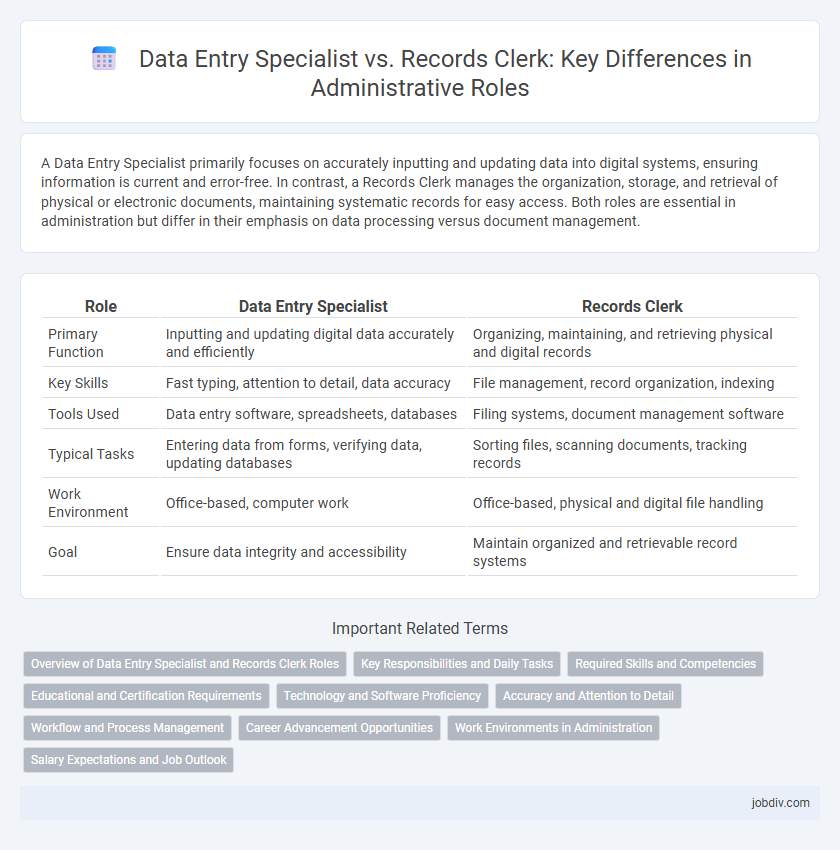A Data Entry Specialist primarily focuses on accurately inputting and updating data into digital systems, ensuring information is current and error-free. In contrast, a Records Clerk manages the organization, storage, and retrieval of physical or electronic documents, maintaining systematic records for easy access. Both roles are essential in administration but differ in their emphasis on data processing versus document management.
Table of Comparison
| Role | Data Entry Specialist | Records Clerk |
|---|---|---|
| Primary Function | Inputting and updating digital data accurately and efficiently | Organizing, maintaining, and retrieving physical and digital records |
| Key Skills | Fast typing, attention to detail, data accuracy | File management, record organization, indexing |
| Tools Used | Data entry software, spreadsheets, databases | Filing systems, document management software |
| Typical Tasks | Entering data from forms, verifying data, updating databases | Sorting files, scanning documents, tracking records |
| Work Environment | Office-based, computer work | Office-based, physical and digital file handling |
| Goal | Ensure data integrity and accessibility | Maintain organized and retrievable record systems |
Overview of Data Entry Specialist and Records Clerk Roles
Data Entry Specialists focus on accurately inputting, updating, and maintaining digital information in databases and software systems, ensuring data integrity and efficiency. Records Clerks manage physical and electronic records by organizing, filing, retrieving, and preserving documents to support organizational compliance and operational workflows. Both roles require attention to detail, proficiency in data management tools, and adherence to confidentiality standards in administrative environments.
Key Responsibilities and Daily Tasks
Data Entry Specialists primarily focus on accurately inputting, updating, and maintaining digital information in databases, ensuring data integrity and efficient processing. Records Clerks manage physical and electronic records, organizing, storing, retrieving, and disposing of documents according to institutional policies and compliance standards. Both roles demand attention to detail, but Data Entry Specialists emphasize data accuracy in software systems, while Records Clerks prioritize document management and regulatory adherence.
Required Skills and Competencies
Data Entry Specialists require exceptional typing speed, accuracy, and proficiency in database management software to efficiently input and verify large volumes of information. Records Clerks need strong organizational skills, attention to detail, and knowledge of filing systems and document retrieval processes to maintain accurate and accessible records. Both roles demand a solid understanding of confidentiality protocols and effective communication skills to support administrative operations.
Educational and Certification Requirements
Data Entry Specialists typically require a high school diploma or equivalent, with many employers preferring candidates who have completed training in computer applications or data management software. Records Clerks often need similar educational qualifications but benefit from certifications such as Certified Records Manager (CRM) or completion of specialized coursework in records administration and compliance. Both roles demand strong organizational skills and familiarity with industry-specific software, though Records Clerks may face higher requirements for knowledge in information governance and regulatory standards.
Technology and Software Proficiency
Data Entry Specialists often excel in advanced software applications such as Microsoft Excel, database management systems, and specialized data entry platforms, enabling efficient and accurate data input. Records Clerks typically utilize document management systems, electronic filing software, and basic office suites to organize and maintain physical and digital records. Proficiency in optical character recognition (OCR) technology and data validation tools distinguishes Data Entry Specialists in streamlining data accuracy compared to the clerical focus of Records Clerks.
Accuracy and Attention to Detail
Data Entry Specialists prioritize accuracy by inputting large volumes of data swiftly while maintaining error-free records to support organizational efficiency. Records Clerks emphasize meticulous attention to detail when organizing, maintaining, and verifying physical and digital files to ensure data integrity and regulatory compliance. Both roles require precision, but Data Entry Specialists focus more on speed and accuracy in data input, whereas Records Clerks specialize in detailed record management and verification.
Workflow and Process Management
Data Entry Specialists streamline workflow through fast, accurate input of information using software tools, ensuring seamless data flow within organizational systems. Records Clerks manage the organization, storage, and retrieval of physical and digital documents, maintaining structured filing systems to support process efficiency. Both roles optimize process management: Data Entry Specialists focus on real-time data accuracy, while Records Clerks ensure systematic document accessibility and compliance.
Career Advancement Opportunities
Data Entry Specialists often have clearer pathways to career advancement through roles such as Data Analyst or Administrative Coordinator due to their proficiency with data accuracy and software tools. Records Clerks typically move toward positions in records management or compliance, leveraging their expertise in documentation and regulatory standards. Focusing on skill development in database management and auditing can enhance promotion prospects in both career tracks.
Work Environments in Administration
Data Entry Specialists primarily operate in office settings utilizing computer systems to input and manage large volumes of digital information, often within industries like finance, healthcare, and logistics. Records Clerks commonly work in administrative environments such as government offices, legal firms, or medical facilities, focusing on organizing, maintaining, and retrieving physical and electronic records. Both roles demand accuracy and attention to detail but differ in their interaction with digital versus physical data management systems.
Salary Expectations and Job Outlook
Data Entry Specialists typically earn an average salary ranging from $30,000 to $45,000 annually, with a job outlook projecting steady demand due to increased digitization of records. Records Clerks, on the other hand, have a median salary between $28,000 and $42,000, with employment growth expected to remain stable as organizations continue to manage physical and electronic documentation. Both roles require attention to detail and organizational skills, but Data Entry Specialists may experience higher salary potential aligned with technical proficiency and software expertise.
Data Entry Specialist vs Records Clerk Infographic

 jobdiv.com
jobdiv.com